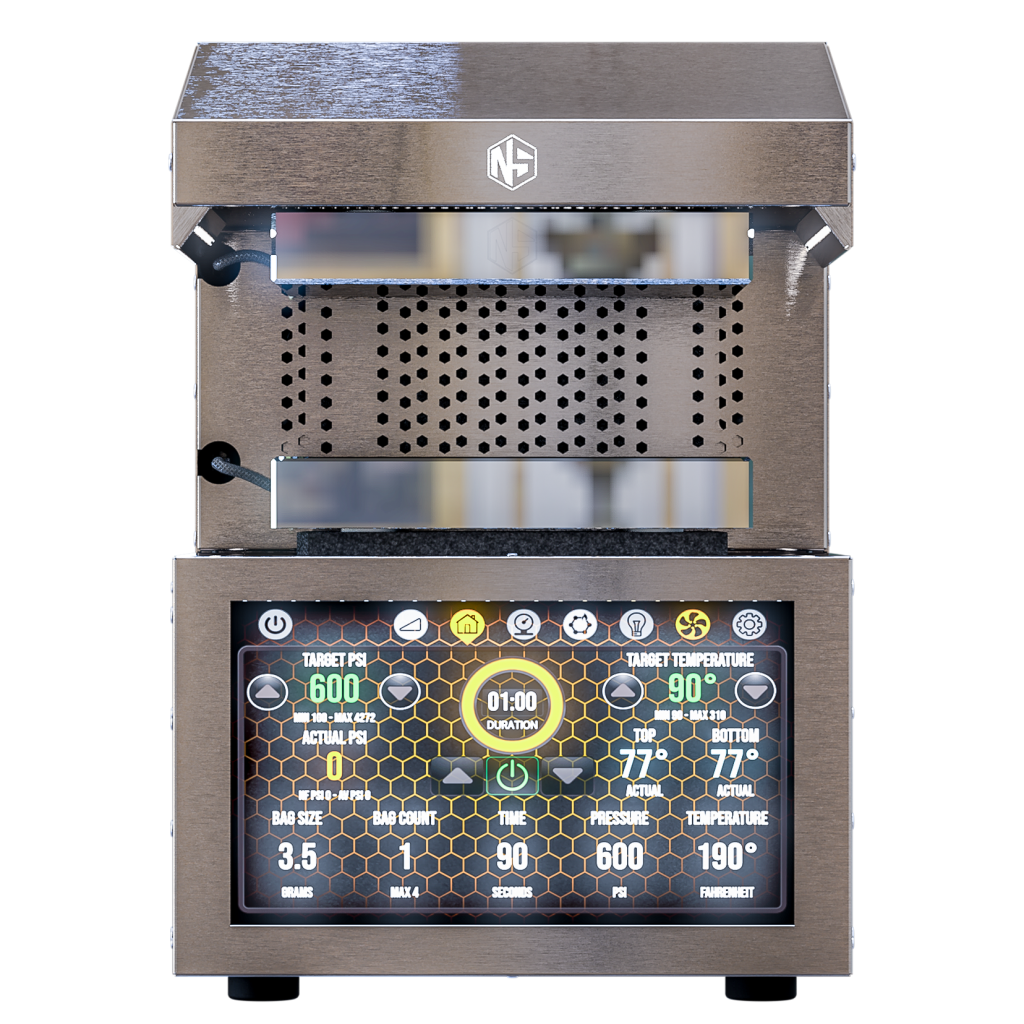By now you’ve likely heard of the healing properties of THC but what exactly is known of the medical benefits of THCA? What kind of high does THCA produce, if any?
Tetrahydrocannabinolic acid, or THCA, is an acid based cannabinoid found in raw and living cannabis plants. THCA is quite unique and is found to have tremendous healing properties, even more so than it’s psychoactive cannabinoid sister, THC. What is this mystery cannabinoid and just how different is it from THC? The cannabinoids found in cannabis are the very compounds responsible for both the healing and psychoactive effects of the plant. THCA is the non psychoactive acidic form of THC, hence the addition of the letter “A”. Through a chemical process called decarboxylation, THCA begins to transform into THC at approximately 220 degrees. Were you ever curious as to why cannabis is most commonly smoked instead of simply consumed raw? The reason is that this heating process is required in order to produce the desired psychoactive effects of the plant.
DOES THCA GET YOU HIGH?
When left unheated, THCA in it’s natural state will not produce psychoactive effects when consumed, it will not get you high. You can eat or even juice the raw plant to reap all the medical benefits of THCA. While juicing is a popular method to consume cannabinoid acids you can enjoy THCA’s effects in salad dressings, raw salad, steamed greens, raw garnish, and raw sauces — get creative!
You can also consume THCA isolate without experiencing psychoactive effects but the most common way to use THCA isolate is by dabbing it, or sprinkling some on top of your flower before smoking. Yes, this method will put the THCA isolate through decarboxylation and yes, that means it will get you high!
The process in which THCA isolate is extracted from flower rosin is through a simple refinement process that removes impurities by applying heat, but not hot enough for decarboxylation to occur. The THCA isolate produces a powerful, pure, and focused high with a THC potency of anywhere up to 95%-100%.
Below is a video of the extraction process done here at Nugsmasher® with our Nugsmasher® Touch rosin press. The step by step guide will show you how we created THCA from flower rosin. This simple process can be done in the comfort of your own home with any of our Nugsmasher® rosin presses but in particular, the Nugsmasher® Touch, XP, and Pro are ideal because of their pressure gauges.
When deciding between consuming raw THCA as opposed to smoking it you should consider that consuming it raw allows the body to absorb 1,000 times the amount of THCA, maximizing the medical benefits but if you’re just looking for the powerful and clean high that’s okay too!
WHAT ARE THE MEDICAL BENEFITS OF THCA?
If THCA has just as much of the healing qualities as THC, why isn’t it as known? It maybe due to the fact that smoking is still the most popular method of cannabis use. Unfortunately when THC goes through decarboxylation, the cannabis retains only about 5% of the original THCA along with it’s potent healing properties. With limited preliminary studies performed on the cannabinoid, information of THCA and it’s healing qualities is still developing, but the existing evidence has had medical professionals excited for it’s role in the future of medicine. Studies have shown that THCA acts as a neuroprotective antioxidant, has antiepileptic, anti-inflammatory, anti-cancer, antiemetic, and analgesic properties.
NEUROPROTECTIVE ANTIOXIDANT
THCA for neurodegenerative diseases, Parkinson’s Disease, Alzheimer’s disease, Huntington’s disease, etc.
Neurodegenerative diseases affect millions of people worldwide. It is characterized by the progressive loss of neurons within the brain or spinal cord. Currently there is no cure for neurodegenerative disease but the debilitating conditions along with the decrease in the quality of life requires research attention. Could THCA perhaps lead medicine in the right direction?
In a 2012 study, the neuroprotective properties of Cannabis were tested on cellular and animal models. The researchers were testing for the protective properties of THCA against MPP(+) which is an established compound in Parkinson’s Disease research. This compound is responsible for cell degeneration. The study found THCA protected dopaminergic neurons against MPP(+) induced cell death and increased cell counts to 123%.
THCA has a binding and activating effect on nuclear receptor PPARγ which regulates adipogenesis, lipid metabolism, cell proliferation, inflammation and insulin sensitization. Results of a 2017 study on THCA and neuroprotective activity show, “THCA shows potent neuroprotective activity, which is worth considering for the treatment of Huntington’s disease and possibly other neurodegenerative and neuroinflammatory diseases.”
Regarding Alzheimer’s disease, Dr. Goldstein told Project CBD in their article, Dosing THCA: Less is More, that daily consumption of 10-20 mg of THCA not only reduced pain in her arthritis patients but in an Alzheimer’s case, THCA improved cognitive symptoms and allowed the patient to reduce the use of other drugs.
ANTIEPILEPTIC
THCA for Epilepsy and Seizure disorders
In the journal Epilepsy & Behavior, THCA’s effectiveness on seizure reduction is examined.
In case study #3 of their research a 10-year-old boy with epilepsy experienced photosensitive seizures up to 4 times a day. He had not responded to multiple seizure medications including carbamazepine, phenobarbital, zonisamide, and levetiracetam. After adding THCA 0.05 mg/kg/day, his parents noted an immediate reduction in seizure frequency. At follow-up after 3 months of treatment with THCA, his parents reported that seizure frequency had decreased 40%, and seizure duration also decreased, enabling the patient to discontinue the use of Diastat for seizure rescue.
Similarly in their case study #4, an 11-year-old girl who suffered from complex genetic epilepsy experienced up to 20 seizures per day following a vaccination. She did not respond positively to specialized diets as well as to xcarbazepine, lamotrigine, rufinamide, valproic acid, and levetiracetam. The medication reportedly even increased seizures. CBD also exasperated the girls seizures but THCA resulted in a reported overall 90% seizure reduction and improved tolerance to temperature fluctuations.
ANTI-INFLAMMATORY
THCA can help Inflammatory Bowel Diseases, Crohn’s Disease, Ulcerative Colitis, Lupus, Arthritis, etc.
Anti-inflammatory medicine reduces inflammation and in turn can help reduce the pain it causes. This type of medicine can range from over the counter ibuprofen to prescription medication accompanied by long-lasting and harmful side effects. THCA is claimed to be the most potent anti-inflammatory cannabinoid in the cannabis plant, even surpassing CBD. Published in a 2017 study on anti-inflammatory activity in colon models, THCA was found to have significant healing effects for Inflammatory Bowel Disease (IBD) patients. THCA and other cannabis extract effects were studied on colon tissue and found that the anti-inflammatory activity of Cannabis derives from none other than THCA.
ANTI-CANCER
“Cannabis cures cancer” is a wide claim that is highly debated and heavily researched. Hundreds of studies are conducted every year in hopes to find a cure. Published in the British Journal of Pharmacology a study examined THCA effects on Prostate Carcinoma and looked closely at the Androgen Receptor Cells. Androgen Cells are required for a healthy prostate gland but are also responsible for maintaining cancerous prostate cells in the body. The 2013 research found that THCA had stronger inhibitory effects on androgen receptor cells than THC did. This type of cancer that affects over 3 million American men each year is expected to double in the next 30 years. Although research is limited, studies such as these are critical to the future of cancer research and THCA’s healing role in Prostate Carcinoma.
ANTIEMETIC
Antiemetic drugs are those that are effective in reducing nausea and vomiting. Studies have long shown cannabis’ positive antiemetic effect but more recently there has been evidence that THCA is largely responsible for the plants antiemetic qualities. A 2013 study on THCA and it’s antiemetic effects has shown comparable effects on nausea between THC and THCA at a dose of 0.5mg but when the dosage was lowered to 0.05mg, THC has no effect on nausea while THCA was still effective, demonstrating a higher potency in antiemetic effects.
ANALGESIC
People around the world turn to cannabis in an effort to ditch the awful side effects of their pain medicine. Published in The Journal of Pharmacology and Experimental Therapeutics, THCA is cited to be capable of interacting with TRPA1 receptor which is responsible for our responses to pain. Further research is being conducted to test the use of THCA to reduce pain.
With limited research studies done on THCA, the results are nonetheless significant and compelling. In these medical case studies very low doses of the cannabinoid have proven more effective than THC, and even CBD in some cases. THCA is a neuroprotective antioxidant, has antiepileptic, anti-inflammatory, anti-cancer, antiemetic, and analgesic properties, what other medical benefits have we not yet discovered? And given that THCA can quite possibly be the purest high, why hasn’t it been given more attention?


